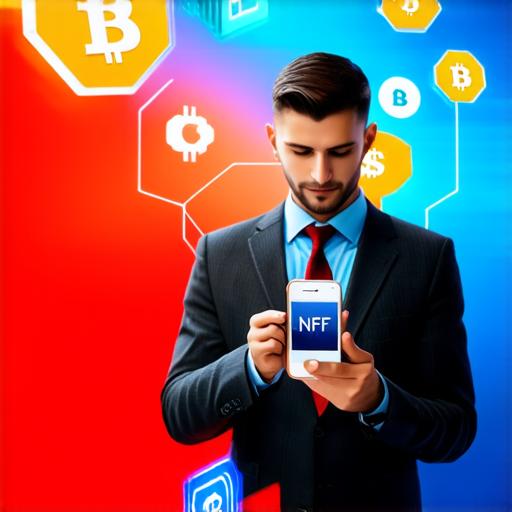
Is investing in an NFT worthwhile
Introduction:
In recent years, non-fungible tokens (NFTs) have gained immense popularity, particularly in the art and collectibles market. These unique digital assets are often described as the future of digital ownership and investment. But with any new technology comes questions about its worth and value.

The Benefits of Investing in NFTs:
-
Unique Ownership: NFTs offer a unique ownership experience by providing an immutable digital asset that cannot be replicated or altered. This feature makes NFTs valuable, particularly for collectors who seek to own one-of-a-kind items. The ownership of an NFT is recorded on the blockchain, making it secure and tamper-proof.
-
Liquidity: NFTs have become highly liquid in recent years, with many investors and collectors buying and selling them on various marketplaces. This means that if you decide to sell your NFT, you can do so quickly and easily, which is a significant advantage for investors looking to maximize their ROI.
-
Potential Appreciation: NFTs are still a relatively new technology, but they have already shown potential for appreciation in value. Some rare and highly sought-after NFTs have sold for millions of dollars, indicating that the demand for these assets is growing rapidly. This suggests that investing in NFTs could be a smart move for those looking to diversify their investment portfolios.
-
Community Building: NFTs also provide an opportunity to build communities around shared interests. Many NFTs are associated with specific art, music, or gaming communities, allowing collectors and fans to connect and engage with each other in unique ways. This can be particularly appealing to those who value social connection and community building.
The Drawbacks of Investing in NFTs:
-
Risk: As with any investment, there is always risk involved when investing in NFTs. The value of NFTs can fluctuate rapidly, and some may even be worthless in the long run. Additionally, the art and collectibles market is highly subjective, which means that what one collector values may not be valued by others.
-
Complexity: NFTs are a relatively new technology, which means that many investors and collectors are still learning about them. This complexity can make it challenging to invest in NFTs effectively, particularly for those who are not familiar with the art and collectibles market.
-
Regulatory Risks: The regulatory environment around NFTs is still evolving, which means that there is a risk of changes in laws and regulations that could affect the value of NFTs. For example, some countries have banned certain types of NFTs or imposed strict regulations on their use, which could limit the potential ROI for investors.
-
Environmental Concerns: NFTs require significant computing power to create and validate transactions on the blockchain, which can be environmentally damaging. This raises concerns about the sustainability of NFTs as a form of investment and their impact on the environment.
Real-Life Examples:
To illustrate the potential benefits and drawbacks of investing in NFTs, it is helpful to look at some real-life examples. One highly publicized example is the sale of a digital artwork known as “Beeple’s First Day of Life” for $69 million in 2021. This sale highlights the potential appreciation that NFTs can experience, particularly when they are associated with highly sought-after artists or artworks.
However, not all NFT investments have been successful. In 2021, an NFT auction house called OpenSea was hacked, resulting in the theft of $8 million worth of NFTs. This incident highlights the security risks involved in investing in NFTs and the need for robust security measures to protect these assets from theft and fraud.
Conclusion:
In conclusion, investing in NFTs can be a smart move for those looking to diversify their investment portfolios and participate in the growing art and collectibles market. However, it is important to be aware of the potential risks involved, including the subjectivity of the market, the complexity of the technology, and regulatory risks. By understanding these factors and staying informed about developments in the NFT industry, investors can make more informed decisions and potentially experience higher ROIs.
FAQs:
1. What are NFTs?
NFTs are non-fungible tokens that represent unique digital assets on the blockchain. These assets can be anything from art to collectibles to virtual goods, and they provide an immutable and secure way to own and trade these items.
2. How do I invest in NFTs?
To invest in NFTs, you can purchase them on various marketplaces or create your own by creating unique digital assets. It is important to research the specific NFT you are interested in and understand its potential value before making an investment.
3. Are NFTs worth investing in?
Whether or not NFTs are worth investing in depends on a variety of factors, including market demand, potential appreciation, and regulatory risks. However, some rare and highly sought-after NFTs have sold for millions of dollars, indicating that the demand for these assets is growing rapidly.
4. How do I protect my NFT investments?
It is important to take robust security measures to protect your NFT investments from theft and fraud. This includes using strong passwords, enabling two-factor authentication, and keeping your private keys secure. Additionally, it is important to research the specific marketplace you are using and ensure that it has a good reputation for security.







